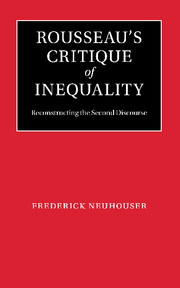The secondary literature on Rousseau, even on the Second Discourse specifically, is excellent and vast, and I list here only a very small part of it. In selecting which works to mention I gave priority to those that seemed to me: (1) primarily philosophical rather than philological in nature; (2) accessible to English-speakers; and (3) of value even to less advanced students of Rousseau. There are, of course, many works that meet these criteria beyond those included here, and I encourage the readers of this book to venture fearlessly beyond these few suggestions.
Brooke, Christopher, “Rousseau’s Second Discourse: Between Epicureanism and Stoicism,” in Christie McDonald and Stanley Hoffmann, eds., Rousseau and Freedom (Cambridge University Press, 2010), 44–57.
Cassirer, Ernst, The Question of Jean-Jacques Rousseau, trans. Peter Gay (New Haven, Conn.: Yale University Press, 1989); reprinted in Scott, ed., Jean-Jacques Rousseau: Critical Assessments, vol. I, 48–78.
Chitty, Andrew, “Needs in the Philosophy of History: Rousseau to Marx,” PhD thesis (Oxford, 1994).
Cohen, Joshua, “The Natural Goodness of Humanity,” in Andrews Reath, Barbara Herman, and Christine M. Korsgaard, eds., Reclaiming the History of Ethics (Cambridge University Press, 1997), 102–39.
Cooper, Laurence D., Rousseau, Nature, and the Problem of the Good Life (University Park: Pennsylvania State University Press, 1999).
Dent, N. J. H., Rousseau: An Introduction to His Psychological, Social and Political Theory (Oxford: Blackwell, 1988), chapters 1–3.
Gourevitch, Victor, “Rousseau’s Pure State of Nature,” Interpretation 16 (Fall 1988), 23–59.
Kelly, Christopher and Roger D. Masters, “Human Nature, Liberty and Progress: Rousseau’s Dialogue with the Critics of the Discours sur l’Inégalité,” in Scott, ed., Jean-Jacques Rousseau: Critical Assessments, vol. II, 257–71.
Lovejoy, Arthur O., “The Supposed Primitivism of Rousseau’s Discourse on Inequality,” in A. O. Lovejoy, Essays in the History of Ideas (Baltimore: Johns Hopkins Press, 1948); reprinted in Scott, ed., Jean-Jacques Rousseau: Critical Assessments, vol. I, 29–47.
Masters, Roger D., The Political Philosophy of Rousseau (Princeton University Press, 1979), chapters 3–4.
Melzer, Arthur M., The Natural Goodness of Man (University of Chicago Press, 1990), parts 1–2.
Neiman, Susan, “Metaphysics, Philosophy: Rousseau on the Problem of Evil,” in Andrews Reath, Barbara Herman, and Christine M. Korsgaard, eds., Reclaiming the History of Ethics (Cambridge University Press, 1997), 140–69.
Neuhouser, Frederick, Rousseau’s Theodicy of Self-Love: Evil, Rationality, and the Drive for Recognition (Oxford University Press, 2008), chapters 1–4.
Neuhouser, Frederick, “The Critical Function of Genealogy in the Thought of J.-J. Rousseau,” Review of Politics 74 (2012), 371–87.
O’Hagan, Timothy, Rousseau (London: Routledge, 1999), Chapter 2.
O’Hagan, Timothy, “On Six Facets of Amour-propre,” in Scott, ed., Jean-Jacques Rousseau: Critical Assessments, vol. II, 338–53.
Plattner, Marc F., Rousseau’s State of Nature: An Interpretation of the Discourse on Inequality (DeKalb: Northern Illinois University Press, 1979).
Scott, John T., ed., Jean-Jacques Rousseau: Critical Assessments, 4 vols. (Oxford: Routledge, 2006).
Scott, John T., “The Theodicy of the Second Discourse: The ‘Pure State of Nature’ and Rousseau’s Political Thought,” American Political Science Review 86 (September 1992), 696–711; reprinted in Scott, ed., Jean-Jacques Rousseau: Critical Assessments, vol. II, 225–56.
Siep, Ludwig, “Rousseau’s Normative Idea of Nature,” Finnish Yearbook of Political Thought 4 (2000), 53–72.
Starobinski, Jean, Jean-Jacques Rousseau: Transparency and Obstruction, trans. Arthur Goldhammer (University of Chicago Press, 1988), chapters 2–3.



